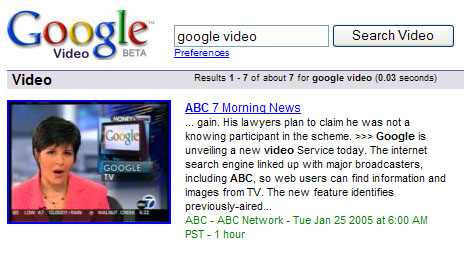Internet search engine Google has launched a trial of its video search system that enables users to search the text of television programmes.
“What Google did for the web, Google Video aims to do for television,” said Larry Page, co-founder of Google. “This preview release demonstrates how searching television can work today. Users can search the content of TV programs for anything, see relevant thumbnails, and discover where and when to watch matching television programs. We are working with content owners to improve this service by providing additional enhancements such as playback.”

The video search will display up to five still video images and five short text segments from the closed captioning of each program. There is also the ability to search for specific words within a show.
The results presented include the programme and episode information, channel, date and time, and will even advise when upcoming episodes of a programme will air. There is also a location based facility to find the next time and channel when a programme will air locally according to zip code – it is currently an American-based service.
“For more than three decades PBS and local PBS stations have pioneered the use of state-of-the-art technology to use media to inform, engage, entertain, and educate the American public,” said Pat Mitchell, President and CEO of PBS. “Today we are proud to join with Google, a company that continues to achieve new levels of technical innovation with the launch of Google Video, a new service that increases the reach and impact of PBS content.”
“Our mission is to give viewers complete access to public affairs programming and we are committed to use new technologies to enhance the value of our services,” said Brian Lamb, chairman of C-SPAN.
The video search works by indexing the closed caption subtitles associated with a programme, and appears to be rather more reliable than speech recognition systems, as used by rival BlinkxTV, provided that the subtitles are accurate.
The video search application has initially been made available as a public beta release as part of the Google Labs programme. It currently only includes material from a limited number of broadcasters, including PBS, Fox News and C-SPAN, and ABC and NBC affiliates in the San Fransisco Bay Area, with whom Google has an agreement to index content. Google is inviting other content owners to take part. For copyright reasons, video clips are currently not available.
Yahoo responded by announcing that it would incorporate closed-caption transcripts at its own test video search site, including the text of BBC and BSkyB broadcasts.
The race is on to provide a reliable means of searching for video content and to devise new paradigms for navigating channels and programmes, particularly as broadband or internet protocol television begins to offer news ways of accessing television.
